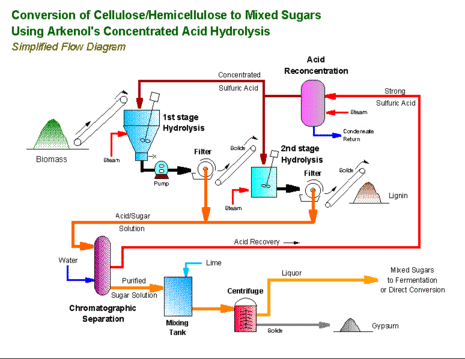Cellulosic Ethanol Update: BlueFire Ethanol
 Cellulosic ethanol is an alternative approach to bio-fuels that could produce liquid fuel for automobiles from waste wood chips, straw, corn stalks, and other non-food biomass. Now we learn from Jim at the Energy Blog, about BlueFire Ethanol, a combination of strategies that promises to cut the cost of ethanol production in half and take the burden of production off of food crops such as corn.
Cellulosic ethanol is an alternative approach to bio-fuels that could produce liquid fuel for automobiles from waste wood chips, straw, corn stalks, and other non-food biomass. Now we learn from Jim at the Energy Blog, about BlueFire Ethanol, a combination of strategies that promises to cut the cost of ethanol production in half and take the burden of production off of food crops such as corn.Some of the most important innovations are:
* Flash fermentation
* Membrane distillation
* Chromatographic separation of the acid from the sugars
The company claims that for the first time the technology enables widely available cellulosic materials, or more commonly, biomass, to be converted into sugar in an economically viable manner, thereby providing an inexpensive raw material for fermentation or chemical conversion into any of a hundred different specialty and/or commodity chemicals
Arkenol determined that the concentrated acid hydrolysis process could be made economically viable through the use of new technology, modern control methods, and newer materials of construction.
To demonstrate the efficacy of the technology, Arkenol has constructed and operated a pilot plant near its Southern California offices for roughly five years. The pilot facility is rated at a nominal 1 ton per day biomass throughput, assuming a 24 hour, 3 shift operating schedule. During normal operation, 1 shift per day is sufficient for feedstock studies, design trials, and normal maintenance. The facility was constructed using readily available pilot equipment using no exotic materials.
Izumi Pilot Plant
A lager pilot facility the 21,500 gallon per year fully integrated Izumi (Izumi is a town located on the southern tip of Japan) pilot plant, using waste wood chips as feedstock, has been operational since 2002. The plant is operated by JGC Corporation in cooperation with Kobe University, Kumamoto University, and four other universities, the National Institute of Advanced Industrial Science & Technology, the Japan Alcohol Association, XNRI Co., Ltd., and others. The plant is funded by New Energy and Industrial Technology Development Organization (NEDO) of the Japanese Government under a five year contract ending in 2007.
Some of the significant features and accomplishments are:
* Wood chips are sized to a nominal 10 mm with high fines fraction.
* Cellulose conversion efficiencies have been stable at 70%, with optimization at 80%.
* Sulfuric acid recovery is over 97% with reconcentration of the 18% dilute acid to 75% in continuous use since 2003.
* A simulated moving bed (SMB) chromatographic separation unit, using small plastic beads, is used to separate the acid fraction from the sugars. SMB's are used in the sugar industry for glucose-sucrose separation and separating sugar from molasses.
* Lignin combustion test (requiring 4 tons of lignin) completed successfully.
* JGC developed flash fermentation offers significant operating cost savings. The fermentation takes place in a fluidized reactor with immobilized media
* Uses NREL developed rec. Z. mobilis (under license) in fixed bed and S. cereviscae to produce ethanol at 95% for over one year.
* Uses first commercial membrane distillation and purification system supplied by Mitsui with significant operating cost savings over conventional (molecular sieve) technology.
This technology is apparently progressing rapidly from proving stage to production stage. It is important to note that once butanol fermentation and purification processes are improved, the same basic processes used in the Blue Fire Ethanol process can be used to produce Butanol--a much superior bio-fuel to Ethanol in many ways.
The ongoing process of replacing petroleum fuels with bio-fuels depends upon the economic tradeoffs involved. If ethanol is used in high concentrations in fuel, some significant changes will have to be made in internal combustion engines, pipelines, and storage technologies. If on the other hand, butanol is produced from the same cellulose instead of ethanol, the butanol can be substituted for gasoline straight across.
With perpetual political instability in the middle east, it is unlikely that the price of petroleum will ever again fall low enough to de-rail the bio-fuels train.
Labels: biomass, Renewable Energy

0 Comments:
Post a Comment
“During times of universal deceit, telling the truth becomes a revolutionary act” _George Orwell
<< Home